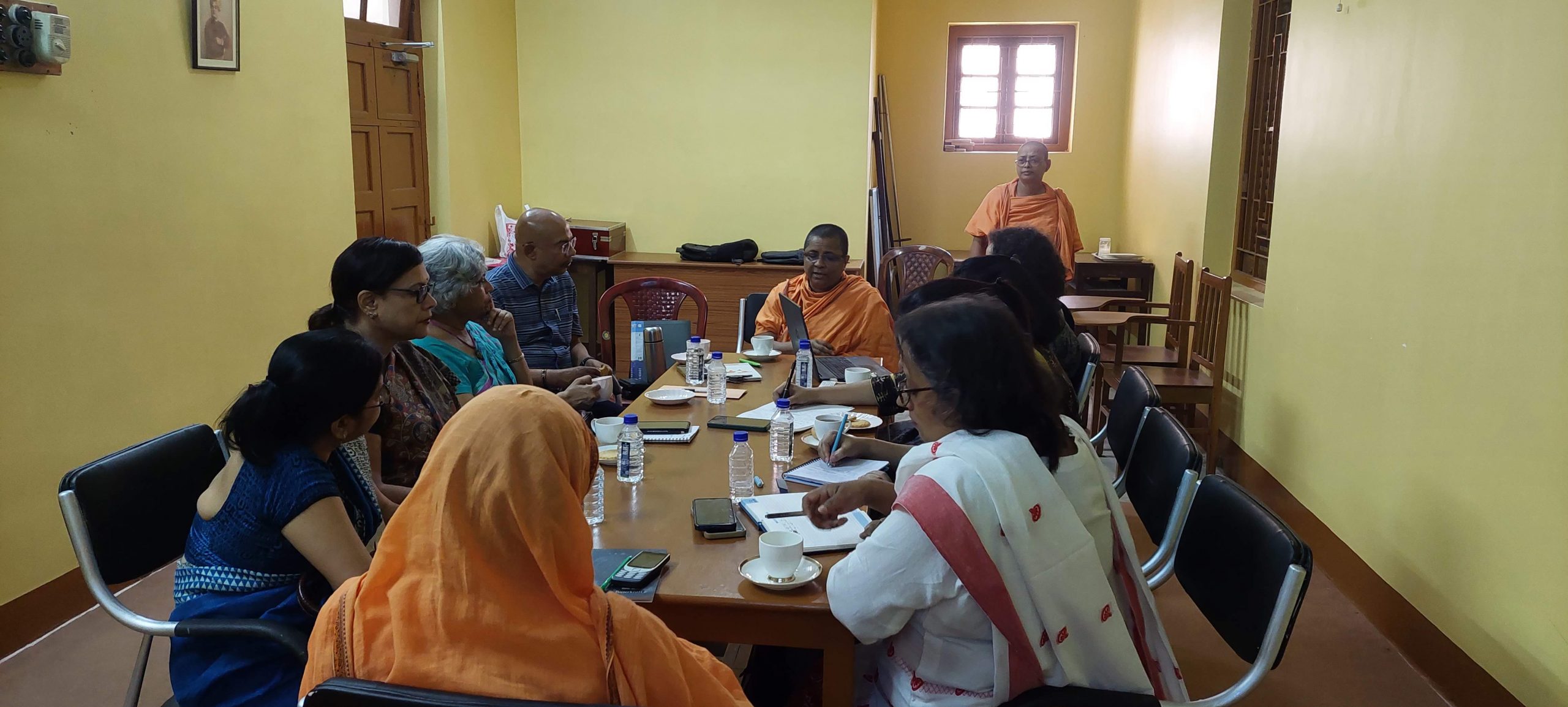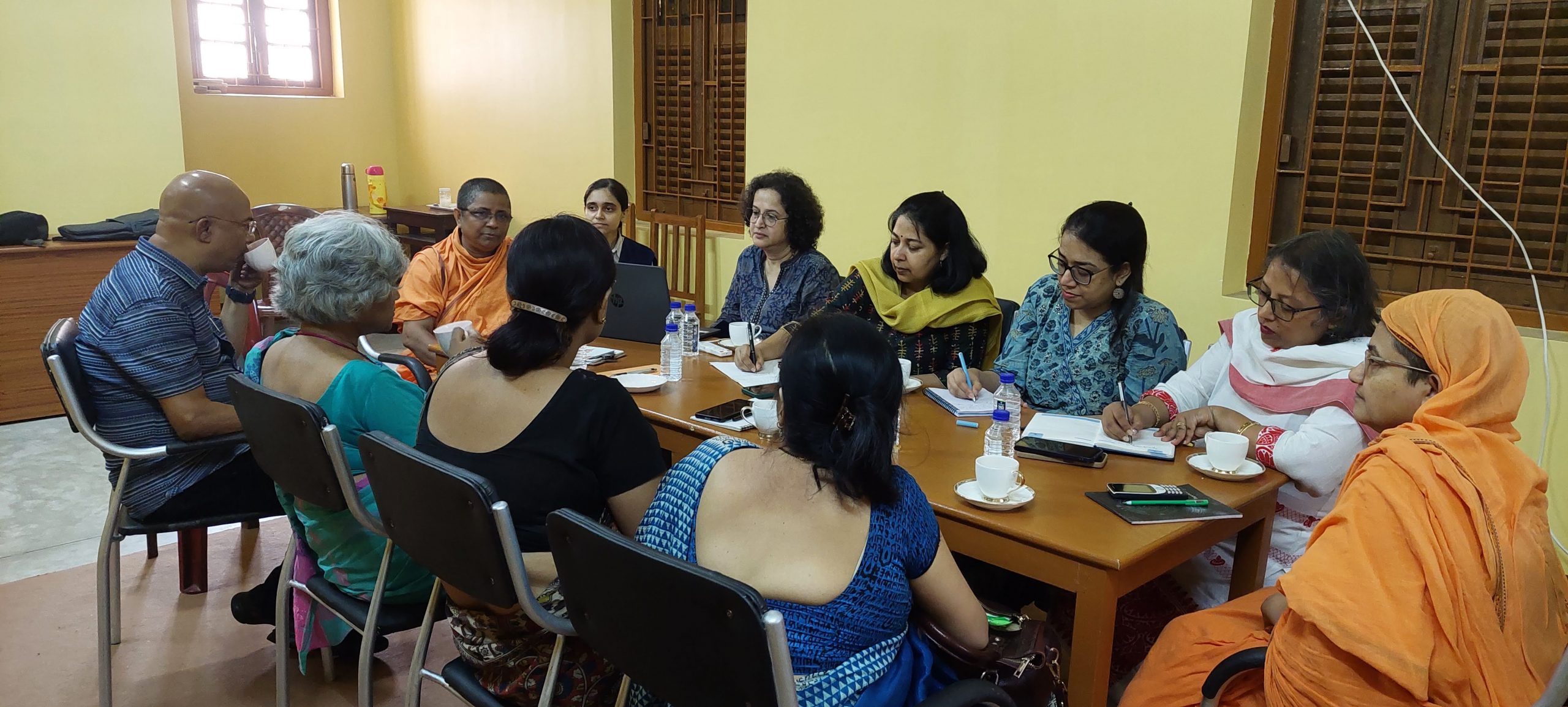

Coordinator:
Dr. Kavita Nath, Assistant Professor, Dept. of Economics
Members:
Pravarjika Amritarupaprana, Office-in-charge
Dr. Saheli Roychowdhury, Assistant Professor, Dept. of Political Science
Dr. Payal Bose Biswas, Assistant Professor, Dept. of Political Science
Dr. Sanghamitra Mukherjee, Assistant Professor, Dept. of Sanskrit
Dr. Sanchali Bhattacharya, Assistant Professor, Dept. of Economics
Smt. Parama Sarkhel, Librarian
Sri Debashish Saha, Industrialist
Prof Mamata Ray Chaudhuri, WBSES
Sm Shatarupa Roy, Industrialist
Dr. Sudakshina Gupta, Professor, Dept. Of Economics, Calcutta University
Smt. Arunima Kumar, (Alumni Representative)
Smt. Sumedha Chowdhury, Sociology Hons, Sixth Semester (Student Representative)
IQAC Formation 1 (2017 to 2019)
IQAC Formation 2 (2019 to 2020)
IQAC Formation 3 (2020 to 2022)
IQAC Formation 4 (2023 to 2025)
| SL No | Best Practices | View |
|---|---|---|
| 1 | Best Practices 2022-2023 | Click Here |
| 2 | Best Practices 2021-2022 | Click Here |
| 3 | Best Practices 2020-2021 | Click Here |
| 4 | Best Practices 2019-2020 | Click Here |
| 5 | Best Practices 2018-2019 | Click Here |
| 6 | Best Practices 2017-2018 | Click Here |
IQAC Meetings 2018-2019
IQAC Meeting 13th August 2018
IQAC Meeting 29th August 2018
IQAC Meeting 3rd October 2018
IQAC Meeting 4th January 2019
IQAC Meeting 20th March 2019
IQAC Meeting 3rd April 2019
IQAC Meetings 2019-2020
IQAC Meeting 25 Sept 2019
IQAC Meeting 3 Jan 2020
IQAC Meeting 9 Jan 2020
IQAC Meeting 11 Jan 2020
IQAC Meetings 2020-2021
IQAC MEETING 10th July 2020
IQAC MEETING 25th August 2020
IQAC MEETING 16th September 2020
IQAC MEETING 11th OCTOBER 2020
IQAC MEETING 20th January 2021
IQAC MEETING 25th March 2021
IQAC MEETING 16th June 2021
IQAC Meetings 2021-2022
IQAC MEETING 2022-2023
IQAC MEETING 04th July 2022
IQAC MEETING 25th July 2022
IQAC MEETING 26th August 2022
IQAC MEETING 11th November 2022
IQAC MEETING 19th December 2022
IQAC MEETING 01st February 2023
IQAC MEETING 27th March 2023
IQAC MEETING 30th March 2023
IQAC MEETING 30th June 2023

| SL No | Annual Report | View |
|---|---|---|
| 1 | IQAC Annual Report 2022 2023 | Click Here |
| 2 | IQAC Annual Report 2021 2022 | Click Here |
| 3 | IQAC Annual Report 2020-2021 | Click Here |
| 4 | IQAC Annual Report 2019-2020 | Click Here |
| 5 | IQAC Annual Report 2018 2019 | Click Here |
| Strategic Planning Document | Download |
Be and Make
Institutional distinctiveness refers to the unique characteristics and qualities that distinguish an educational institution from others in terms of its mission, vision, values, academic programs and support services.
The college is founded on the philosophy of Sri Ramakrishna Dev, Sri Maa Sarada Devi, and Swami Vivekananda – the “Holy Trio” behind the establishment of the Sri Ramakrishna Sarada Math and Mission. Their philosophy of enriching one’s inner self through knowledge, love, compassion, sacrifice, fellow-feeling and openness, acts as the guiding principle behind the planning and activities of the college. The college aims at imparting integral and holistic education tempered with compassion, conscience and competence, simultaneously focusing on fulfilling Swami Vivekananda’s dream of an ideal nation steered by empowered women – educated, self reliant, responsible, informed citizens who will act as harbingers of change.
The distinctiveness of the institution lies in its commitment to offer an academic and intellectual experience that foster independent thought and responsible action, as well as self learning and introspection among students.
As a 63 year old educational institution of high repute, the primary hallmark of distinctiveness of RKSMVV is its commitment to provide an active, unrestricted and enriching learning environment to its students for a focussed yet extensive academic experience. The college is known for its disciplined apolitical atmosphere, rigorous curriculum, and dedicated and experienced faculty. Students at RKSMVV come from diverse socio-economic backgrounds; ranging between first-generation learners from the remotest of villages, and students from urban English medium background. The college recognizes the diversity regarding learning ability, exposure, and other relevant factors and has policies and mechanisms to address this diversity.
The college provides a carefully curated variety of learning methods and experiences, both within and beyond the classroom, along with optimal use of infrastructural and digital resources, to facilitate effective learning for all categories of learners and maximize their learning potential.
The end semester results reflect the success:
| Final year examination | Program | Students appeared | Students passed | Progression to higher studies | Campus Placement |
| 2022-2023 | UG BA/BSc |
131 |
129 |
64 |
12 |
| PG MA |
8 |
8 |
|
|
|
| 2021-2022 | UG BA/BSc |
111 |
111 |
67 |
26 |
| PG MA |
8 |
8 |
|
|
|
| 2020-2021 | UG BA/BSc |
97 |
96 |
62 |
9 |
| PG MA |
9 |
9 |
|
|
|
| 2019-2020 | UG BA/BSc |
107 |
103 |
69 |
15 |
| PG MA |
8 |
8 |
|
|
|
| 2018-2019 | UG BA/BSc |
101 |
101 |
64 |
12 |
| PG MA |
4 |
4 |
|
|
RKSMVV offer students scope for vibrant co-curricular and extra-curricular activities that extends the traditional emphasis on academic excellence to incorporate personal, interpersonal, and societal skills and attitudes essential for holistic growth. The curriculum includes independently designed value added courses ranging from Srimadbhagvadgita to Digital Marketing, from Python to Paninian Grammar, and from Computer skills to Organic manure making out of kitchen waste. Co-curricular activities include NSS, Sports & Games, Yoga, Music, Dance, Martial Arts, Dramatics, Bratachari, and vocational courses like Cutting-Tailoring-Embroidery, Fine Arts, Handicrafts, Jewellery and Candle making, Bakery, Jugaad or upcycling.
The college prepares students to develop self growth and competence necessary to face the challenges of an increasingly competitive professional world by offering various skill based and career oriented trainings, including language, communication, computer and soft skill trainings.
Outreach programmes are an integral part of an institution like RKSMVV. Following Swami Vivekananda’s ideals of service to society through the uplift of its deprived classes, the institution regularly conducts several outreach programmes involving the local community and neighbourhood, in which students actively participate. Activities include health camps, relief work and donation drives, awareness workshops and rallies, neighbourhood beautification, old age home and slum visits. This fosters in them a sense of social responsibility and sensitization towards societal, ethical and environmental concerns.
The college takes extra care to provide a value based and inclusive environment upholding core values of unity, diversity, inclusiveness and humanism. The distinctive institutional inclusive practices, particularly the college uniform, the morning prayers, weekly value education classes, youth conventions on moral-ethical values, and respectful observance of occasions of national importance, create a sense of inclusive national identity
that is secular and multicultural in each student, irrespective of class, caste or religion. This is evident in the alumni, who step out into the larger world as responsible, respectful, honest and tolerant citizens, trained under strict discipline and mentoring by the Monastic members.
Aligned with the institution’s distinctive emphasis on tradition and culture, and considering its institutional and intellectual resources, Indian Knowledge System has been identified as a specialized area of interest. The IKS Cell is designed to disseminate and promote an in-depth understanding of, and research on, the ancient Indian knowledge systems, and consequently, to instil a sense of values in the students encouraging selfless community engagement through outreach programmes and initiatives.
Another distinctive feature of RKSMVV is its environmental practices, with a focus on environmental sustainability. Collaborative ‘Green Campus’ projects with the West Bengal Biodiversity Board, NSS awareness programmes and observances, guided campus tours for local school students, are among the activities that initiate students to work towards a greener and cleaner world as sensitized and responsible future citizens of the world.
RKSMVV has several institutional initiatives to provide confidence to students through career oriented trainings, placements facilities, mentoring, professional counseling, to name a few, enabling them to emerge as employable graduates, and leaders charged with new ideas and the capacity to make a difference.
In addition, the following features contribute to an atmosphere conducive to self development and realization of full intellectual potential of students: